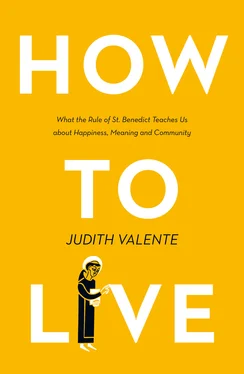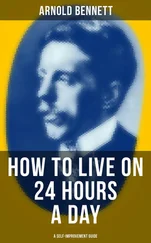The 3rd- and 4th-century monks who lived in the desert considered the silence of the night a valuable teacher. Night reminds us that time is passing. Our lives, like days, are finite. Antony, one of the most revered of the desert monks, advised, “Each day when we arise, let’s assume we won’t live until nightfall. And at night, when going to sleep, let’s assume we won’t awaken.” His wasn’t a morbid fascination with death, but a reality check. We have a limited amount of days in which to live, so we might as well wake up and act now. There is important work to do.
If you desire true and eternal life, “keep your tongue free from vicious talk, your lips free from all deceit; turn away from evil and let peace be your quest and aim.” (Ps 34: 14–15).
—FROM THE PROLOGUE
For Benedict, awakening our senses to our physical surroundings is the natural prelude to awakening the heart. In high school, I had a wonderful teacher for freshman English named Margaret Henley. Miss Henley was something of an aspiring poet, as well as the faculty advisor for the school literary magazine and thus a group of us girls who fancied ourselves emerging writers. All writers, she would say, begin as observers. She challenged us one day to recall the eye color of the bus driver who took us to school that morning. I should have known this. I knew the driver’s name. He was a regular along my route. He had even taped a piece of cardboard onto the corner of the bus’s front window that said, scrawled in sparkle ink, “Wishing You A Good Day, Your Driver Sam.” But the color of Sam’s eyes? I could only guess. Blue?
Ever since that day in class, I’ve tried to not only notice, but also truly observe the people I pass in the street, the grocery store, or sit next to on the bus—not to mention the people I interview as a journalist. Still, I fall down on the job. As a young reporter for the Dallas Times Herald, I was sent to write about a man who, over the years, had portrayed Santa for something like ten thousand children. He was a jovial fellow, just about the right size for Santa, with a seemingly inexhaustible well of patience. He appeared to experience deep joy in being around children. He spoke lovingly of his own grown children.
At about eight o’clock that Christmas Eve, the phone rang at my home. It was Joe, the man who played Santa. He was in tears. He told me how much he appreciated the article I had written about him. He thanked me for being so kind to him. Because of my kindness, he wanted me to know it was all a faade. He in fact hated Christmas. His wife had divorced him. His children didn’t talk to him. Every Christmas, he found himself alone. In fact, all the while he was volunteering at hospitals, stores, and children’s parties as Santa, he had been living out of his car because he couldn’t afford an apartment. He said it was all he could do to not think about killing himself as he took off his red Santa suit for the last time of the season.
Why hadn’t I seen any of this coming? How could I, a trained observer, have missed picking up on even an inkling of this man’s pain? I called my parents and told them I’d be late coming over to their home for Christmas Eve dinner. With a friend, I drove over to the part of town where Joe was sitting in his broken down car on that cold December night. We tried to convince him to come back with us to my parent’s house for a meal. He didn’t want to come, but thanked us for spending time with him. You could say my best gift that Christmas Eve was that I woke up.
What is not possible to us by nature, let us ask the Holy One to supply with the help of grace.
—FROM THE PROLOGUE
In his autobiography, Chronicles , singer-songwriter Bob Dylan says one of the greatest influences on his life was his maternal grandmother. She once told him something he never forgot: “Everyone you’ll ever meet is fighting a hard battle.” Joe is a prime example. To truly see Joe, I first had to break out of the tomb of my own self-absorption. I had to climb out from my own battleground so I could see someone else’s “hard battle.”
Joe’s story has a somewhat happy ending. About a year later, I ran into him. He was dressed in a business suit and said that with the help of a social service agency, he was able to scrape together enough money to begin making belts and other leather goods for sale. The business wasn’t exactly booming, but he had customers among the people he met over the many years he had played Santa. St. Benedict asks us to awaken to the whisper of the sacred in our daily lives. And then he asks more. He asks that we wake up to the people around us—to truly see them. In a beautiful scene in the musical version of The Bridges of Madison County, the main character at one point asks her lover to look deeply at her hands, her mouth, her shoulders. She says, “talk to me, like there’s something to say.” One of the greatest gifts we can give to others is to let them know they are seen and heard.
The Benedictine Abbot Jerome Kodell writes about partaking of “the sacrament of the present moment.” That is what I felt I was doing that Christmas Eve with Joe. It is an attitude of awareness I try to cultivate toward the people I meet every day who are fighting their hard battles. It is a way to run with the light, and live.
 I will create a timeline of my life, noting significant events such as educational and professional achievements, births and deaths of loved ones, marriages, even traumas. Is there a pattern that emerges? Were there times when I felt prompted to “wake up?”
I will create a timeline of my life, noting significant events such as educational and professional achievements, births and deaths of loved ones, marriages, even traumas. Is there a pattern that emerges? Were there times when I felt prompted to “wake up?”
 Where does my life seem to be heading?
Where does my life seem to be heading?
 Is my life best described by action verbs, or is it characterized by passive tense as I allow events to act on me, shaping my attitudes and responses? How can I become a more active player my life?
Is my life best described by action verbs, or is it characterized by passive tense as I allow events to act on me, shaping my attitudes and responses? How can I become a more active player my life?
 Do I live as if I would never die, like the old almond tree planter, or do I live like Zorba—as if I could die any minute? Is there wisdom in both views?
Do I live as if I would never die, like the old almond tree planter, or do I live like Zorba—as if I could die any minute? Is there wisdom in both views?
 In what ways am I sleepwalking through life right now? How can I wake up?
In what ways am I sleepwalking through life right now? How can I wake up?
4
IS THERE LIFE BEFORE DEATH?
On Living Fully
Day by day remind yourself that you are going to die.
—FROM CHAPTER 4, “THE TOOLS FOR GOOD WORKS”
I have always had a terrible fear of death. It often grips me in the middle of the night. At those times, I wake seized with the anxiety that I will one day no longer occupy the chair at my work desk, my place at the kitchen table, or my side of the bed.
This fear began at an early age. It may have something to do with having parents who were older when I was born. They looked like my friends’ grandparents. Grandparents had the unfortunate habit of dying. I feared my parents would die and I’d be left alone.
I was also haunted early on by a sense of life’s brevity. One New Year’s Eve as I watched Guy Lombardo’s orchestra on TV with my parents, a band member sang, “Enjoy Yourself (It’s Later Than You Think).” When he got to the line about how the years go by “as quickly as a wink!” I began to weep uncontrollably. I was four years old at the time.
Читать дальше

 I will create a timeline of my life, noting significant events such as educational and professional achievements, births and deaths of loved ones, marriages, even traumas. Is there a pattern that emerges? Were there times when I felt prompted to “wake up?”
I will create a timeline of my life, noting significant events such as educational and professional achievements, births and deaths of loved ones, marriages, even traumas. Is there a pattern that emerges? Were there times when I felt prompted to “wake up?”










